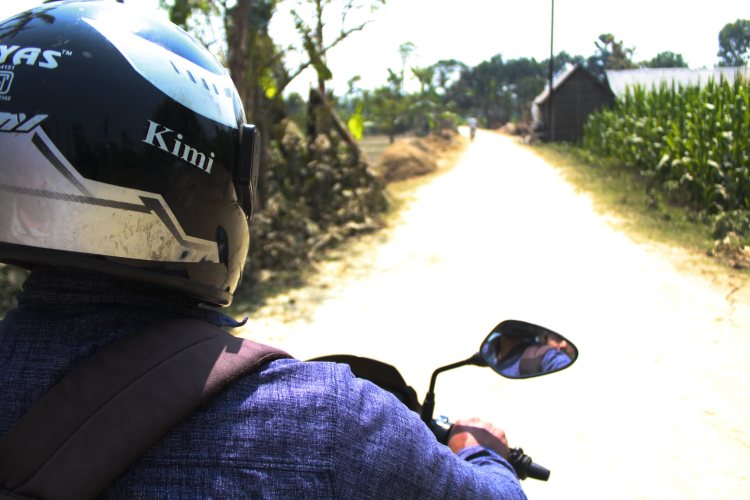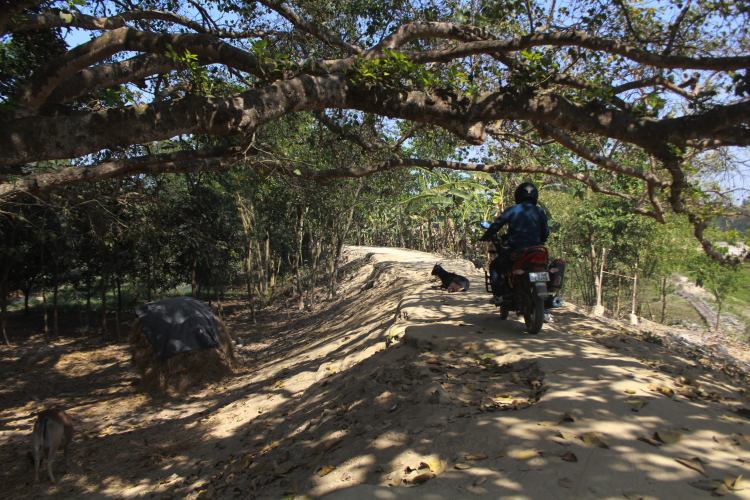We often only appreciate and acknowledge the ‘results’. Be it a complex phenomenon such as social change or a thing as simple as online commodities coming to our doorsteps, we only appreciate the results. We don’t see the enormous amount of energy that is channelized to get the desired results. We don’t generally see the consistent people working hard amidst difficult circumstances.
Likewise, when we talk about microfinance, we delve deep into its origins, feasibilities, and impact. Without any doubt, we can say that micro-finance has brought a huge wave of change in rural gender dynamics. Hence for rightful reasons, micro-finance has also entered into academia; all its nuances are discussed and analyzed. But rarely do we find mentioning of the people who stay in the grassroots and makes rural-micro-financing possible and sustainable.

A collection officer with borrowers.
Let’s talk about them today. They are called ‘Collection Officer’ in the micro-finance lingo. They are the people posted at the grassroots who have direct contact with the women borrowers. They interact with the women face to face on a daily basis. Their main work is to identify the borrowers, verify the documents, provide financial assistance and collect the instalments from the borrowers. The task mentioned is almost everything that a micro-financing firm does. Identification of the borrowers involves sieving through the Self Help Group members of the area and identifying who needs and wants financial assistance. Then they do the documents verifications and deliver the money. After that comes the tiring and most challenging part as said by the several collection officers I met, collecting the instalments. It is undoubtedly the most significant part of the whole process because the return of the money makes sure that the micro-finance chain is sustainable. If the money does not return, many other women will not be benefited and the micro-finance will collapse. But these collection officers are making sure that the cycle continues.

Susanto collecting signatures from the borrowers.
“Sir is one of our family members” Aradhana, one of the Self Help Group member and a borrower remarked as she talked about one of the Collection officers. As the COs meets the borrowers frequently, they indeed become a family member and above all, they share a mutual respect for each other. They do a lot of hard work as a part of their job.

A collection officer in his way to the borrower's home.
“We have to travel approximately 50 to 60 kilometres daily on our motorcycles to meet different borrowers,” said Susanto, one of the collection officers with Gram Bikash Kendra, posted in the northern part of Bengal. “At the end of the day, I feel good as I know that I have done my job and many people who need financial assistance has got it”, Susanto added. The number of people they meet and the inter-personal rapport they maintain with all of them is perhaps the key to the ‘faith’ between the microfinance organizations and the borrowers, a key without which the existence of the organization might get jeopardized.

Travelling in the village near the India-Bangladesh border.
So, next time when we discuss Micro-finance, with all the subtleties and nuances let us also credit Susanto and alike, the hard working Collection Officers, who are undoubtedly the spine of the micro-finance industry.
Likewise, when we talk about microfinance, we delve deep into its origins, feasibilities, and impact. Without any doubt, we can say that micro-finance has brought a huge wave of change in rural gender dynamics. Hence for rightful reasons, micro-finance has also entered into academia; all its nuances are discussed and analyzed. But rarely do we find mentioning of the people who stay in the grassroots and makes rural-micro-financing possible and sustainable.

A collection officer with borrowers.
Let’s talk about them today. They are called ‘Collection Officer’ in the micro-finance lingo. They are the people posted at the grassroots who have direct contact with the women borrowers. They interact with the women face to face on a daily basis. Their main work is to identify the borrowers, verify the documents, provide financial assistance and collect the instalments from the borrowers. The task mentioned is almost everything that a micro-financing firm does. Identification of the borrowers involves sieving through the Self Help Group members of the area and identifying who needs and wants financial assistance. Then they do the documents verifications and deliver the money. After that comes the tiring and most challenging part as said by the several collection officers I met, collecting the instalments. It is undoubtedly the most significant part of the whole process because the return of the money makes sure that the micro-finance chain is sustainable. If the money does not return, many other women will not be benefited and the micro-finance will collapse. But these collection officers are making sure that the cycle continues.

Susanto collecting signatures from the borrowers.
“Sir is one of our family members” Aradhana, one of the Self Help Group member and a borrower remarked as she talked about one of the Collection officers. As the COs meets the borrowers frequently, they indeed become a family member and above all, they share a mutual respect for each other. They do a lot of hard work as a part of their job.

A collection officer in his way to the borrower's home.
“We have to travel approximately 50 to 60 kilometres daily on our motorcycles to meet different borrowers,” said Susanto, one of the collection officers with Gram Bikash Kendra, posted in the northern part of Bengal. “At the end of the day, I feel good as I know that I have done my job and many people who need financial assistance has got it”, Susanto added. The number of people they meet and the inter-personal rapport they maintain with all of them is perhaps the key to the ‘faith’ between the microfinance organizations and the borrowers, a key without which the existence of the organization might get jeopardized.

Travelling in the village near the India-Bangladesh border.
So, next time when we discuss Micro-finance, with all the subtleties and nuances let us also credit Susanto and alike, the hard working Collection Officers, who are undoubtedly the spine of the micro-finance industry.








